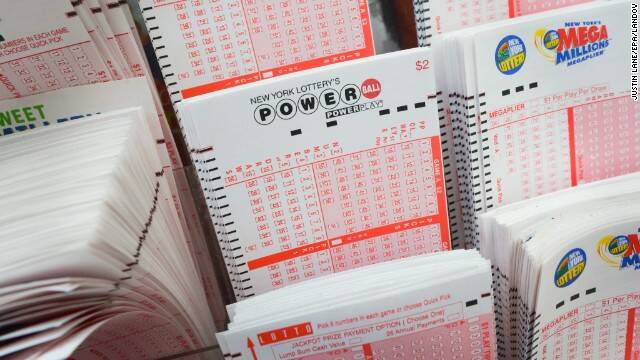The Seventh Commandment says it succinctly: “You shalt not steal.” I wonder, though, if the man who brought down the two tablets from the mountain ever considered playing the lottery a form of “stealing.” What would Moses say if he ever laid eyes on the roulette table in Las Vegas or dared to put down his two bucks on a horse in the 9th race at the Aqueduct, or wagered on the winner of a presidential election? More plausibly, would he be found, standing in a very long line outside a candy store, with pencil in hand, jotting down a series of numbers on a slip or two in the hope of winning a fantastical sum of money? Would he have, like the rest of us, caught the Powerball bug?
I couldn’t help thinking about this as I waited on line to participate in this national phenomenon, nay, obsession; it’s been going on for weeks. With no winners at any time, the amount of the money to be won has skyrocketed faster than a Saturn V to the now astronomical sum of $1.5 billion. And perhaps by the time the drawing is held (on Wednesday, Jan. 13), it could conceivably go even higher. I’ve tried to avoid it, but it was to no avail. I don’t normally play the lottery very much, maybe a scratch-off ticket once in a while when I get the itch, but otherwise, I pretty much believe what the fellow once said about the sure way to double one’s money: fold it over once, and put it in your wallet.
I am rather timid when it comes to things like this; I have seen too many people take great enjoyment in betting the milk money in the hopes of getting their pot of gold. It’s disconcerting to walk into the neighborhood candy store expecting to pick up a newspaper and something to appease the sweet tooth and see otherwise nice little old ladies surrounding the lottery machine, barking out their numerical calculations like they were General Patton on the battlefield.
It has left me wondering, this business with fame, money and wealth. It is not without reason that word—fame—is almost always mentioned in conjunction with the other two. When you win that kind of serious money, fame cannot be far behind. You often hear stories about sudden wealth and the subsequent suddenness in which it all disappears, due to a lack of proper planning or just plain squandering (like the Prodigal Son).
At one time or other, people, whether they are (already) rich or poor, gamble, whether on situations, life or money. We often “take chances” as the phrase goes, hoping that everything will turn out it our favor. Ruminating about the efficacy—and the morality—of gambling has been a favorite “parlor game” of many a philosopher or theologian. I even went so far as to enquire what The Catechism of the Catholic Church has to say about this matter; it is instructive:
2413 Games of chance (card games, etc.) or wagers are not in themselves contrary to justice. They become morally unacceptable when they deprive someone of what is necessary to provide for his needs and those of others. The passion for gambling risks becoming an enslavement. Unfair wagers and cheating at games constitute grave matter, unless the damage inflicted is so slight that the one who suffers it cannot reasonably consider it significant.
So lotteries are “not in themselves contrary to justice” unless and until they may hurt people, whether it is the gambler or others. The problem of course, is if such activity becomes “an enslavement.” So this is what we must guard against, that, in “wagering,” we do not become the “slaves” of it, and they become our “master.” That is a good caveat to keep in mind. But I am reassured to know that even the best of us have gambling instincts. Why, even religious do that: Pope Pius IX liked to shoot pool (so I’ve read) and James Cardinal Gibbons of Baltimore, advisor and friend to American presidents in the early 20th century, liked a good cigar while placing a wager on the horses at the track.
As the popular lottery slogan has it: “You’ve got to be in it to win it.” Maybe so, as long as you’re not in it to lose it all. You may be in it to play it, but don’t take it so seriously: remember to laugh about it while you’re thinking of 1.4 billion things to do with that money, should you win. There was a reverend who once asked a congregant what she thought of his admonition against the “wages of sin.” The lady nodded appreciatively and said: “Oh, my yes, the price of everything is going up nowadays!”
And this one, too, about the Irishman who, on a visit to America, suddenly found himself the owner of a winning lottery ticket and quickly collected what was his and got on the plane back home. But he was terrified that something would happen to the plane; so he made a vow: “Dear God, if you let me and this plane land safely, I’ll give you half my fortune!” So, sure enough, the plane landed safely and everybody disembarked. However, a priest came up to him and tapped him on the shoulder saying: “Excuse me, I couldn’t help overhearing what you said to God on the plane—I’m happy to help you keep your vow…” Whereupon the Irishman declared: “As soon as the plane landed, I made another vow to God: if I ever go up in a plane again, He can have it all!”
So, when you’re on line, ready to place the winning bet and dreaming of that big payoff—among other things—remember to be patient and to laugh. It won’t hurt to remember also the old Chinese proverb: “If you must play, decide upon three things at the start: the rules of the game, the stakes, and the quitting time.” Or better yet, ruminate about what Jay Leno said about lotteries: “How come you never see a headline like: ‘Psychic Wins Lottery’?”
Good luck!








